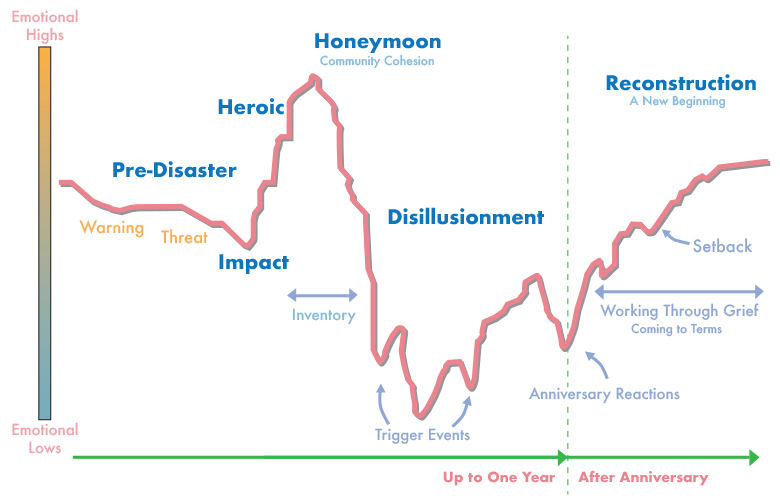Recently I have been reading about Covid Fatigue and our human responses to it. Covid Fatigue is a response to disaster. Just like the famous stages of grief, there are predictable stages of disaster response. I read a helpful article about it on the US Department of Health and Human Services webpage. These stages are predictable and helped explain, for me, a lot of what I’m seeing on the news.
- Phase 1, the pre-disaster phase, is characterized by fear and uncertainty. Disasters with warning can cause guilt or self-blame for failure to heed the warnings. With Covid-19, we had several months of warnings before the pandemic really hit the United States. We had an opportunity to prepare, but did not.
- Phase 2, the impact phase, is characterized by a range of intense emotional reactions. These reactions can range from shock to overt panic. Initial confusion and disbelief typically are followed by a focus on self-preservation and family protection. The impact phase is usually the shortest of the six phases of disaster.
- Phase 3, the heroic phase, is characterized by a high level of activity with a low level of productivity. During this phase, there is a sense of altruism, and many community members exhibit adrenaline-induced rescue behavior. The heroic phase often passes quickly into phase 4.
- Phase 4, the honeymoon phase, is characterized by a dramatic shift in emotion. During the honeymoon phase, disaster assistance is readily available. Community bonding occurs. Optimism exists that everything will return to normal quickly. Heroic efforts to contain the disaster continue.
- Phase 5, the disillusionment phase, is a stark contrast to the honeymoon phase. During the disillusionment phase, communities and individuals realize the limits of disaster assistance. As optimism turns to discouragement and stress continues to take a toll, negative reactions begin to surface. The increasing gap between need and assistance leads to feelings of abandonment. People are tired of extended heroic efforts and may take unnecessary risks.
- Phase 6, the reconstruction phase, is characterized by an overall feeling of recovery. Individuals and communities begin to assume responsibility for rebuilding their lives, and people adjust to a new “normal.”
Does any of that sound like what we have been going through? For me it is easy to see that we are heavy into the disillusionment phase. Covid Fatigue is evident in the young people having parties, people refusing to wear masks, and the rest of us growing tired of being cautious.
So how do we deal with Covid Fatigue? The University of California Davis has some suggestions. Get exercise, preferably outside, everyday. Be compassionate with yourself and others. Recognize that most of us are doing the best we can, even if we don’t always agree with other’s choices. Connect with others in person, by telephone, Zoom, text, or social media. Practice gratitude for what you have and what you can do. And, one more way that I recommend, know that God holds our future and cares for us in the present.
How are you coping with Covid Fatigue? What is helping you through this time? Galatians 6:9 is a good verse for us to remember today. Let us not become weary in doing good, for at the proper time we will reap a harvest if we do not give up. Don’t give up. We will get through this and learn to live with what we cannot change.
God of yesterday, today, and tomorrow, give me strength for the tasks ahead of me each day. Help me not to grow weary of doing the right thing. May I be your hands and heart to someone in need of your love today. Let what I am experiencing be a way that I am drawn closer to you. Amen.

